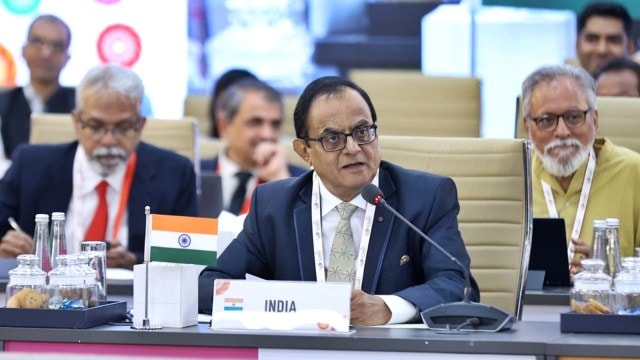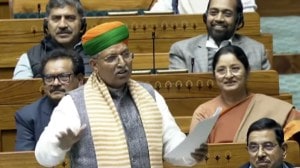How does India scale up its innovation ecosystem, or foster its deep tech future? According to Principal Scientific Adviser to the Government of India Ajay Kumar Sood, while there is now an increasing sensitivity in policy circles to put deep tech startups on an accelerated path, India has to aim to become a “product nation”.
India is already very good at designing — nearly one in five of the world’s semiconductor design engineers, for instance, are here — but the country accounts for under 10 per cent of the global chip design facilities, and much of the designing is done for specifications offered by global companies. “We have a lot of designers… But what we need is that we should have designing capabilities (based) on our specifications, not on someone else’s specifications, which means some intellectual thinking has already (been done) somewhere else. We have to do it here… So that’s what will make our country a leading product nation,” Sood, who is also the Chairperson of the Prime Minister’s Science, Technology & Innovation Advisory Council and is a National Science Chair Professor at the Indian Institute of Science (IISc) Bangalore, told The Indian Express.

For this objective, India needs to think beyond manufacturing. “What do you need (to be) a ‘product nation’? Think about it. It’s not just manufacturing… Manufacturing, of course, is required, down the line, but it (manufacturing) is not the only thing, because then you will get into the middle income trap. Because the profits will go somewhere else,” Sood said. In sectors such as cellphone assembly and chip manufacturing, for instance, much of the profits in the value chain are before and after the manufacturing stage.
“What we need is, can we really have a product that is not based on somebody else’s design, but our design. So, I think, that is what the culture we need to bring in. Our youngsters are very, very good, actually. I mean, the design companies that are there in Bangalore, all our engineers there, are very good, but they are designing for somebody else, and to their specifications. Question is, why can’t we have our own GCC (global capability centres)? And there are some companies that are coming up now, in manufacturing, such as Bharat Forge, the Tatas are doing (some work), Tech Mahindra is there… More has to happen. So, my passion is really, how to foster that,” said Sood, who has a Doctorate in Physics from IISc Bangalore and his research interests include the physics of quantum materials.
One of the key mandates of the PSA’s office is technology foresight, and, while Sood concedes that in the deep tech segment, the number of startups that are coming out in India is relatively low, he is seeing a quiet transformation.
“The good news is that there is an increasing sensitivity to take the deep tech startups on an accelerated path… So, for example, in quantum itself, there are now about 35 companies in quantum alone, and they are deep tech, obviously. A few of them are big. But many of them are small startups. So, under the National Quantum Mission, there is a provision to fund startups… Now, eight startups have been funded under the quantum mission for these deep tech startups. Similarly, this will happen in the AI mission,” Sood said.
“In the AI mission, which is now being done by MeitY (Electronics Ministry), one vertical is fully (focused) on startups. So, my own sense is now that there is very high sensitivity to enhancing deep tech startups, but we have to see that all conditions are favorable (for fostering this),” he said.
Story continues below this ad
One area where India has done exceedingly well is the national space programme, in not just proving that the country can do cutting edge stuff, but that it can be done by the public sector at a fraction of the cost benchmarks. And now private players are getting into the sector in a big way.
On whether India can replicate the success of the space sector in other areas, Sood said, “Yes (it can be done)… For example, in defence, there is the iDEX programme (Innovations for Defence Excellence, an initiative of the ministry of defence to support innovation and technology development in the defence and aerospace sectors)… is a huge success.” Then there is BIRAC (Biotechnology Industry Research Assistance Council, a Department of Biotechnology initiative) to promote startups in the biotechnology sector. “The biotech ecosystem has grown in startups because of BIRAC,” he said. iDEX in defence and BIRAC in biotechnology are very similar to what India is doing in space, he said.
But there is a crucial difference between these sectors and the others. “In space, there is an advantage, because the players exactly know what to do. Similarly, in defence too, one knows exactly what is required. But in other areas, we have to also create the demand for future products.”
“That really is the challenge… and this is where we will need the support going forward,” Sood said.









